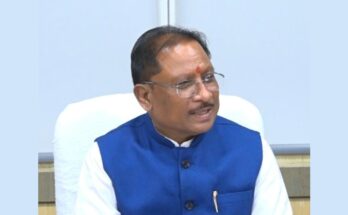Keeping in view the special circumstances of Chhattisgarh, a request was made to include the amended provision of reservation in the Ninth Schedule of the Constitution.
In the Reservation (Amendment) Bill passed by the Chhattisgarh Legislative Assembly in December 2022, provision has been made to give reservation to different classes in proportion to the population.
In Chhattisgarh, 13 percent for Scheduled Castes, 32 percent for Scheduled Tribes, 27 percent for Other Backward Classes and E.W.S. 4 percent reservation has been made to
Raipur, 17 April 2023
Chief Minister Mr. Bhupesh Baghel has written a letter to the Prime Minister Mr. Narendra Modi, in December 2022 by the Chhattisgarh Vidhansabha for various categories of Scheduled Castes, Scheduled Tribes, Other Backward Classes and E.W.S. According to the bill passed for the purpose of giving reservation to the people of the population on the basis of population, the amended provision of reservation has been urged to be included in the Ninth List of the Constitution. In the Reservation (Amendment) Bill passed by the Chhattisgarh Legislative Assembly in December 2022, 13 percent for Scheduled Castes, 32 percent for Scheduled Tribes, 27 percent for Other Backward Classes and E.W.S. Provision has been made for 4 percent reservation.
The Chief Minister has written in the letter that keeping in view the special circumstances of the state of Chhattisgarh, only by including the amended provision of reservation in the ninth list, justice will be available to the deprived and backward classes. The Chief Minister has urged the Prime Minister to direct all concerned for this.
Chief Minister Mr. Baghel has written in the letter that in the total population of Chhattisgarh, 32 percent are Scheduled Tribes, 13 percent are Scheduled Castes and 42 percent belong to other backward classes. 44 percent of the state is covered with forests and a large area is surrounded by inaccessible hilly areas. Due to all these reasons, difficulties have to be faced in conducting economic activities in other parts of the state except the plain areas. According to the 2012 report of the Reserve Bank of India, the number of poor in the state of Chhattisgarh was the highest in the country (about 40 percent). The socio-economic and educational condition of the OBC people of the state is as weak as that of the SC/ST people. 3/4th of these classes are farmers, marginal and small farmers and a large number of them are agricultural laborers.
The Chief Minister has written in the letter that from the year 2013, a provision of 12, 32 and 14 percent (total 58 percent) reservation was made in the state for members of Scheduled Castes, Tribes and Other Backward Classes respectively, which was upheld by the Chhattisgarh High Court in the year 2022. Cancelled. In December 2022, the State Legislative Assembly again unanimously passed the bill on the basis of the population of different classes, SC, ST, OBC and E.W. S. It was decided to make the revised percentage of reservation for SCs 13, 32, 27 and 4 per cent respectively. This bill is currently pending with the Governor for his approval.
EWS in November 2022 by the Constitutional Bench of the Supreme Court. Due to the legalization of the decision to give 10 percent reservation to the people belonging to the backward class, the way has been paved to increase the limit of reservation from 50 percent. In the last month, proposals have been passed in Jharkhand and Karnataka Legislative Assemblies to increase the percentage of reservation for various classes to more than 50.
It is noteworthy that in the state of Tamil Nadu, where the per capita income is much higher than that of Chhattisgarh, and in many states of the North-East, reservation for tribes and backward classes is more than the limit of 50 percent. Keeping in view the special circumstances of the state of Chhattisgarh also, only by including the amended provision in the Ninth Schedule of the Constitution, the people of the deprived and backward classes will be able to get justice. It is requested that all the concerned may kindly be directed in this regard.




